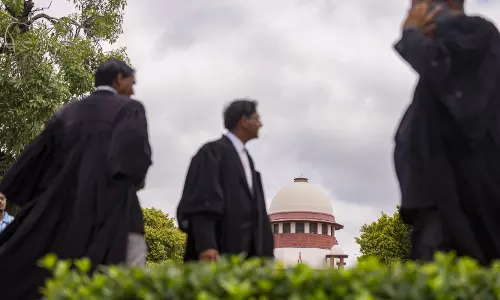

Muslim League moves SC challenging Centre's attempt to implement CAA through backdoor
text_fieldsNew Delhi: Indian Union Muslim League (IUML) has moved the Supreme Court challenging the Centre's notification making it possible for persons residing in certain districts who are belonging to minority communities in Afghanistan, Bangladesh and Pakistan, to apply for Indian citizenship.
The Intervention Application was filed by the party through Advocates Haris Beeran and Pallavi Pratap.
In the plea, IUML has averred that during the hearing of its earlier writ petition challenging the Citizenship Amendment Act, 2019, the Centre had submitted that staying of the Amendment Act was not necessary since the rules of the Amendment Act had not been framed.
The plea states that the Central government in an attempt to circumvent the assurance given to this Hon'ble Court in the earlier petition has now sought to implement their mala fide designs envisaged under the Amendment Act through the recently issued order dated 28.5.2021.
According to the plea, during the pendency of the writ petition against CAA, the Ministry of Home Affairs, Union of India has gone ahead and issued the order dated 28.5.2021 which is manifestly illegal and runs counter to the provisions of the Act, as well as the Constitution.
The plea has also challenged Order 3A of the Foreigners Order 1948 and Rule 4(ha) of the Passport (Entry into India) Rules, 1950 as void, for being in violation of Articles 14, 15 and 21 and the basic structure of the Constitution for discriminating among persons on the basis of their faith and religion
Lastly, the plea argues that if the said Order is implemented and citizenship is given to persons on the basis of their religion, and, thereafter, if the Court strikes down the Amendment Act and rules, then, to take back the citizenship of these persons, granted pursuant to the present Order, will be a herculean task and would be near impossible to implement.
IUML was the first party to approach the apex court against CAA, even before the Act received the Presidential assent.
It was on Friday (May 28) that the government issued a gazette notification granting powers under existing rules to authorities in 13 districts of Gujarat, Chhattisgarh, Rajasthan, Haryana and Punjab to accept, verify and approve citizenship applications from members of minority communities hailing from Pakistan, Afghanistan and Bangladesh.
But this order was issued under the Citizenship Act, 1955 and the Citizenship Rules, 2009 and not under the Citizenship Amendment Act, 2019 since its rules have not yet been framed.
The Citizenship Amendment Act (CAA), passed in the Parliament in 2019, had ignited enough controversy and nationwide protests as it involved religious discrimination and was against the constitutional values of India.
The problematic Act thus triggered around 140 petitions against it at the Supreme Court so far. These petitions, which were adjourned for the final hearing, have not been considered so far by the court, despite the lapse of a year and a half.





















